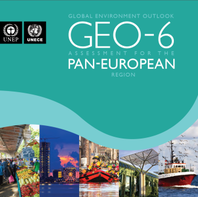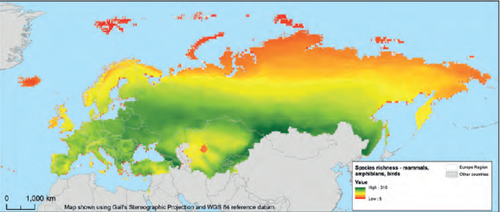
As part of the new 6th Global Environment Outlook (GEO-6) UNEP has just released a separate Assessment for the pan-European region. The report provides an overview on the current state, trends and an outlook for the environment, and also highlights environmental factors that contribute to human health and well-being at the regional level.
Biodiversity is of central importance for human well-being and features prominently in the GEO-6 regional assessment. The state of biodiversity and ecosystems continue to give reason for major concerns and call for continued attention and increased efforts. The European Biodiversity Observation Network – EU BON – through its coordinating institution, the Museum für Naturkunde - Leibniz Institute for Evolution and Biodiversity Science contributed significantly to this report.

Credits: UNEP/UNECE 2016, UNEP-WCMC based on IUCN (2014) data
The assessment for the pan-European region clearly indicates that biodiversity loss and ecosystem degradation is continuing in the region. Ongoing biodiversity decline and loss is particularly high in Eastern and Western Europe. Some positive developments and individual success stories offer lessons worth learning, for example developments of protected area networks such as Natura 2000 and the pan-European Emerald Network. However, an important challenge that needs urgent attention is improving availability and open access to comprehensive and integrated biodiversity data to support assessments and analysis, as well as planning and implementation of conservation efforts.
The full report can be found here: http://bit.ly/21q2ghL
UNEP press release: http://bit.ly/24A7sQN
For more information please contact:
Dr. Christoph Häuser christoph.häuser@mfn-berlin.de and Dr. Florian Wetzel florian.wetzel@mfn-berlin.de
Museum für Naturkunde Berlin, Leibniz Institute for Evolution and Biodiversity Science, Invalidenstrassse 43, 10115 Berlin.




 RSS news
RSS news Print this article
Print this article
